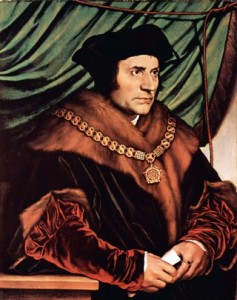Thomas More and the Bishop of Rome
by Bishop Robert Barron | November 17, 2010 1:00 pm

St. Thomas More by Hans Holbein
My favorite movie is “A Man For All Seasons,” a film based on the Robert Bolt play of the same name. I first saw it when I was in high school, and I’ve watched it at least once a year every year since then. When I was teaching full time at the seminary, I would show it to my students, and on June 22nd, I would offer a screening to my fellow faculty members. That date, of course, is not accidental, for it is the feast day of the great St. Thomas More, with whose final years the movie deals.
The drama of “A Man For All Seasons” turns around King Henry VIII’s attempt to secure a divorce from his first wife, Catharine of Aragon, who had been unable to produce for the King a male heir. Through the agency of Cardinal Wolsey his chancellor, Henry sought a dispensation from the Pope, but the Holy Father refused. Upon the death of Wolsey, the King made Thomas More, a man noted for his scholarship, diplomatic skill, and sanctity, his next chancellor, and he continued in his efforts to persuade the Pope. When he was met, once again, with a rebuff, Henry took matters into his own hands, breaking with Rome and declaring himself supreme head of a new English church, which promptly granted him the divorce he had so ardently sought. Thomas More had been extremely loyal to Henry VIII and solicitous for the good of the English government, but this was too much. Without explicitly providing a reason to explain his action, he simply resigned his office as chancellor. Some of the most affecting scenes in “A Man For All Seasons” have to do with the years following More’s resignation, when Henry tried, by various means, to frighten and cajole his former chancellor into supporting the new religious arrangement. Through it all, More (played by the magnificent Paul Scofield) held steady, even when he was stripped of his freedom, locked up in the Tower of London, and threatened with the rack.
Finally, he was forced to stand trial for high treason. The proceedings took place in a room with which More—a lifelong man of the law—was well acquainted: Westminster Hall. By means of legal chicanery, bribery, and jury tampering, More was convicted. Before they passed sentence, the judges asked if the former chancellor had anything to say. More rose to speak and delivered himself of a speech that is reproduced, almost word for word, in the script of the film. He explained that he had opposed Henry VIII because the King had assumed for himself an authority “….that was granted by the mouth of Christ our Savior to St. Peter and the bishops of Rome, whilst he lived and was personally present here on earth,” and he concluded, “it is therefore insufficient in law to charge any Christian to obey it.” As he stood condemned to death, within the confines of Westminster Hall, Thomas More offered this exquisitely eloquent defense of the primacy and authority of the bishop of Rome. Scofield’s reproduction of this speech is perhaps the most thrilling moment in “A Man For All Seasons.”
I couldn’t help but think of all of this when, last month, a shy German scholar, who is also the Bishop of Rome, entered that same Westminster Hall in the presence of the representatives of the British political and judicial establishment. After making a few opening remarks, Pope Benedict XVI invoked the name of the man who, five centuries before, had stood condemned in that very place: “In particular, I recall the figure of St. Thomas More, the great English scholar and statesman, who is admired by believers and non-believers alike for the integrity with which he followed his conscience…” How strange and wonderful are the ways of God! In Westminster Hall, More was a lone voice calling out in defense of the authority of the Pope; a half millennium later, the Pope came to the same place and vindicated the martyred saint. But I don’t mean this in a religiously jingoistic way, as if Benedict XVI had stripped the Archbishop of Canterbury of his power and reasserted Roman Catholic control over the Church of England.
He did it by exercising his considerable moral authority. Before the prime minister and his government, in the presence of the four living former prime ministers, in the hearing of captains of industry and academics, Pope Benedict asserted that ethical principles, discerned through religious and philosophical forms of reasoning, must provide the basis for democratic deliberation and cannot be, themselves, the subject of that deliberation. He insisted—in his quiet way—that the bracketing or questioning of those moral absolutes leads any government on a short road to chaos. And this is why, the bishop of Rome went on, aggression toward religion—sadly apparent in the West today—is not only a violation of a basic human right, but also a threat to the integrity of the democratic experiment.
Thomas More was condemned in Westminster Hall for defending the authority of the Pope. In that same place, a quietly authoritative bishop of Rome subtly rose to More’s defense.
Source URL: https://integratedcatholiclife.org/2010/11/barron-thomas-more-and-the-bishop-of-rome/